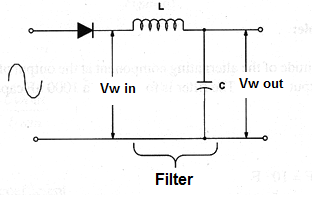The filter coefficient is defined as the ratio between the amplitude of the alternating component at its input and the amplitude of the alternating component at the output. The filter coefficient is calculated by the following formulas:

Formula 1
Filter coefficient I:
? = Vwin / Vwout
Where:
λ is the filter coefficient
Vwin is alternating component at the filter's input in volts (V)
Vwout is alternating component at the filter's output in volts (V)
Formula 2
Filter coefficient II:
λ = w2 x C x L - 1
Where:
λ is the filter coefficient
w = (2 x ? x f) where f is the frequency of the alternating current at the filter's input (Hz)
C is the capacitance in farads (F)
L is the inductance in henry (H)
Application example:
Determine the amplitude of the alternating component at the output of a RC filter operating in the 60 Hz power line with an output of 12 V. The filter is formed by a 1 000 µF capacitor and a 10 H filter:
Data:
L = 10 H
C = 1 000 µF = 10-3 F
f = 60 Hz
Vwin = 12 V
Vwout = ?
Applying formula 2 to calculate ?:
λ=[ (2 x 3.14 x 60)2 x 10-3 x 10) - 1] = 141.9 - 1 = 140.9
Calculating Vwout:
Vwout = 12 / 140.9 = 0.085 V or 85 mV



